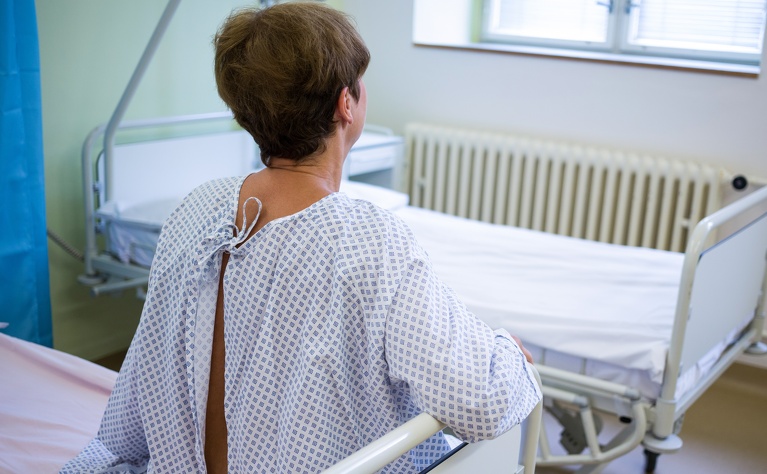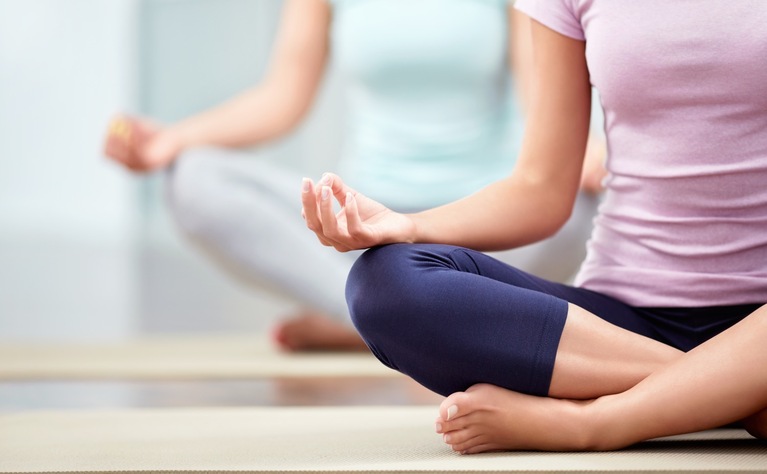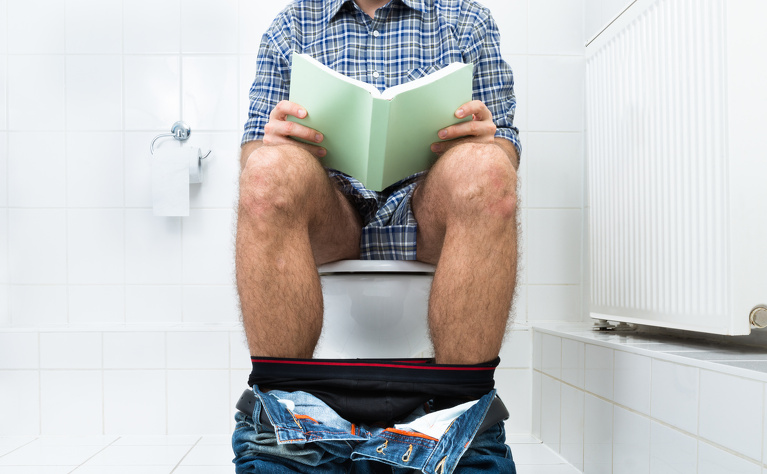Find this article useful?
Why not sign up to our mailing list and receive regular articles and tips about IBD to your inbox.

We all have to do it at some point. That chilly room. That gaping gown. That cold hard table. All those people looking at your poor goose pimpled bottom as you lie on your side and consent to an unenjoyable anal probing. Yes, the colonoscopy; many IBDers’ necessary evil, and nobody’s easy conversation topic.
The useless little leaflet they give you in your GI consultation contains little about how to cope with this unpleasant procedure that can make a person with inflammatory bowel disease (IBD) feel even more bummed out than they already do.
Yes, you are told when and how to drink the godawful “bowel prep” but there’s plenty of other things to do to get through what can be a very emotionally, psychologically and physically exhausting experience.
However, with the right attitude, support and toilet paper, why not even enjoy it as a solid bit of “me-time”?
The chemical laxative provided by the hospital, or “bowel prep”, does what it says on the tin - so that side of things is pretty straightforward. You know you’re going to be inside for a little while as you empty the entire contents of your bottom until your pooing fresh air.
So, here are a few ideas to prepare yourself for an evening, and possibly morning, of self-induced runs. Or dare I say, a good old clean out.
It really helps to try and approach your colonoscopy with positivity and courage. We can often feel like victims when our chronic disease takes over our daily life. A colonoscopy is a horrible experience, let's not kid ourselves, but it is also a game-changing event in your journey towards health.
It can provide us amazing insights into how we take the next part of our treatment, and it can even, quite literally, be a fresh start for our bowels - a blank canvas; a chance to start over with good diets and bowel care. So face your fears with hope and even a little excitement. It’s also one chance when you’re supposed to be having continual diarrhoea!
Also, don’t forget that the procedure itself is only minutes long which can be accompanied by a lovely sedative and gas and air. Mmmmm. You’re also in the hands of fantastic professionals who know exactly what they are doing and want to help you. Have trust. Surrender. The more you relax, the easier it will be. And however unpleasant, it will soon be over.
This is a time to look after yourself and there is a lot of strength to be found in surrendering to the healing process. Make your place feel cosy, a sanctuary, even a sacred space to host a cleansing ritual. You can use this time of bodily cleansing to perhaps clear other negativities in your life. In some traditions, east and west, sage is burnt to cleanse an environment of negative energies (if you’re into that sort of thing), or just find some nice incense you like or smelly candles to clear the air and sweeten the ambience. Maybe even have a spring clean and get rid of some unnecessary “stuff” clogging up your life.
Of course, the procedure is short, but it is certainly not sweet. You may feel fine after a sleep or even just getting back home, but it’s a good idea to take at least one day off work to recover (especially if you've had a sedative). Your doctor may flippantly mention that your bowels may take a little time to recover, and this is absolutely true, even if you follow good post-procedure advice.
You don’t want to go back to work, especially if it’s a stressful environment, when you’re still having chemically induced runs. We are all human and stress is no good for anybody, especially after a procedure that requires so much head, heart and bowel space. It can take up to three days for your bowels to calm down and return to whatever is “normal” to you pre-poke, or hopefully better. It could even get a little worse for a while, so be prepared to give yourself plenty of time to heal and adjust.
The hospital information recommends being with someone before and after the procedure as you may feel weak from losing fluids and not eating for a while. If you know you’re going to be fine and don’t suffer from low blood pressure or fainting episodes then be assured that you are not putting yourself in danger by going it alone if that’s what you prefer. As long as someone is taking you to and from the hospital for the event itself, and you have a phone nearby just in case you do feel wobbly.
However, having the right person there can be nice. They can provide moral support, and together you can even enjoy a bit of toilet humour...as long as they don’t want to eat your favourite meal in front of you or take a long bath in the only bathroom. And make sure they’re someone who doesn’t mind being interrupted mid-sentence as you run to the loo for the umpteenth time, and someone who is willing to put the kettle on, or run out for more toilet roll supplies at the drop of a hat!
As you can’t have any solid food or opaque fluids like milk etc during your prep you need to think about what you can have, and how you can enjoy it. Health professionals suggest drinking squash and black teas etc - but why add to the chemically induced nausea from the bowel prep with sugars, sweeteners, and undiluted tannins?
These can all increase the acidic levels and heat in the body, which means more chance of diarrhoea stinging, lasting longer after the procedure, and even risk of infections such as UTIs that can arise in the urinary tract from any high reaching diarrhoea splashes. Yes it can happen!
There are other more delicious and natural “clear fluids”. Coconut water is a must. It may be a little pricey, but if there’s any time to treat yourself, it is now. Think of all the money on food you're saving missing three meals! Coconut water replaces minerals and salts in the body that you lose with diarrhoea, it’s been used as a natural way of clearing UTIs for centuries. It’s also good to take a carton with you to have straight after the procedure. The ultimate refresh.
If you do like tea or coffee, have low blood pressure or suffer from caffeine withdrawal headaches, then melt some natural sweetener into the drink in replacement of milk. This helps to protect the stomach from over acidifying from the neat tannins. Brown rice syrup, stevia, molasses, or jaggery are not too bad for you, some would say a good source of energy and vitamins. If you like honey, make sure you melt it into the drink after it has cooled a little as honey at boiling point as many believe it is more toxic than nourishing.
You can also drink boiled water with a little salt in (1tsp salt to 1 litre of water) if it suits your tastes and you’ve had enough sweetness. This can keep low blood pressure from dropping as you empty your body of fluid and salts through diarrhoea. It is also believed to help clean your intestines, so if you are concerned about the chemicals from the prep this is a good option to keep them being washed through. The salt water goes straight to the bowel when it is warm and mixed in this quantity so you wont put pressure on your kidneys by peeing it out.
Herbal and fruit teas are also a lovely option, but opt for calming, sweet and even bitter flavours for anti-inflammatory and gentle laxative properties. Try chamomile, liquorice, nettle, and rooibos and avoid ginger and other such spicy ones.

Whilst stuck inside doing what you need to do in preparation for the procedure, and even during the days recovering afterwards, you may not feel like risking a jog, walk or running outdoor errands in case the diarrhoea hasn’t settled yet.
Yoga is a great way to move the muscles, get the blood flowing, and stretch out tensions, and you can do it at home. Try a few sun salutations to get moving, some calming postures such as forward folds, and some digestive postures such as wind-releasing pose, seated twists, and hero’s pose.
Of course, yoga is not just about moving the body but is a meditative practice to focus and calm the mind. Whilst in the postures don’t forget that the breath connects your mind and body, and as you breathe slowly and deeply you can find stability in the postures and steady the mind. All meditation and other mindfulness techniques are really helpful to reduce anxiety about the incoming procedure and regain a positive perspective after it.
Effective yogic pranayama (breath control) can be as simple as deep breathing techniques like counting to 4 as you inhale and 8 as you exhale. This can be done in a posture or just sitting or lying comfortably.
Yoga Nidra and Restorative yoga are also lovely techniques for relaxation.
Another simple mindfulness technique is to sit or lie comfortably and visualise a blue sky as your mind. Any thought or worry that comes into your mind is visualised as a cloud in the sky and breathed out as though blown away by the wind revealing just pure blue sky once again.
When we are feeling anxious, alone and vulnerable we often get caught up in our emotions and concerns so these meditation techniques allow us to calm down, step back, see the procedure as a step in the healing process and not a fearful threat. Through this mind training we can keep our composure so we are ready for the next stage in our battle.
Now is the time to pick out your favourite movies and TV series or get stuck into a new box set of that film you’ve been meaning to watch for years.
Toilet literature (Toi-Lit?) is also a necessity in a situation such as this. Treat yourself to that once a year copy of Vogue, National Geographic, Gary Larson anthology or the Sunday Times. When do you ever get the chance to read something like this from cover to cover?! Of course, a good book can come with you as you have to dart from sofa to bathroom. Still, nothing beats one of these.

Continual diarrhoea can be hard on the bottom at the best of times, but with the chemicals in the bowel prep our poor little ringers are in for a stinger! Coconut oil is a lovely and cooling oil to apply to this area once wiped and clean - and make sure you wash your hands before and after applying it.
You may want to use baby wipes to ensure complete cleanliness during any explosive episodes (although it mostly just streams out!), but they’re not essential and can be stingy too. Wetting toilet paper is enough sometimes and can be more soothing. Good old Vaseline also protects and acts as a barrier cream.
For the ultimate relax of muscles and mind have a long bath. Adding epsom salts nourishes the body with minerals and salts from the skin inwards - a good alternative route to replenishment. Avoid strong smelly cosmetics that could cause soreness. Make sure your bath is nice and hot but not too hot that you feel faint, your blood pressure could drop more easily when your body is empty.
Apply cooling coconut to the entire body and maybe even enjoy painting your nails, massaging potions into your beard, applying a face pack...anything that makes you feel GORGEOUS despite the ongoing unglamorous activities.
Once you’ve slept off a bit of the sedation (if you've had it), and released as much of the pumped in air as possible with some funny farts (hysterical if you’re still high), you’re allowed to finally consume again! But don’t be hasty - you’ve now got a lovely clean bowel. Where to start? My advice is to avoid the hospital’s silly sandwiches, and if you can (and fancy it) start with a good sup of coconut water.
You may need to travel home so you also don’t want to suddenly gorge on anything too much before you head off. You may also notice blood still coming from your poor botty if they have taken biopsies - totally normal. They do often want to see you consume something before you leave. If you can, prepare a very simply very soft white rice with ghee mixed in. Take it with you in a sealed food thermos. The easily digested rice lines the bowel with the butyric acid of the ghee so it can calm and replenish your red flaw innards. If you’re vegan, or just don’t like ghee, you can use olive oil. So just have a few bites in the hospital, and have some more at home. Stick to this simple dish for the rest of the day.
The next day you should consider probiotics as the first thing that enter the gullet. Recommended by many GI doctors and alternative medical practitioners and seekers is the probiotic “Symprove”. This company deliver courses of live probiotic bacteria to your door whereby you sup a little cup of the stuff daily. The approach of tackling an unbalanced microbiome may have great effect on IBD. Research is big in this department right now.
For the next couple of days go easy on yourself and your bowel. Respect the healing process and remember this is a fresh start. Maybe try a simple dietary adjustment to see if this has any positive effect on your bowel health such as cutting out dairy, gluten, refined sugars or nightshades. But mainly try and relax. Phew! It’s over!
Why not sign up to our mailing list and receive regular articles and tips about IBD to your inbox?